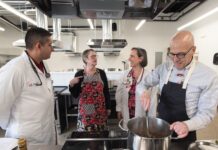Did you realize that sweating is only a part of how the body cools itself? The process of evaporation is a key step. This important fact explains why it is much easier to develop a heat-related illness when the relative humidity is high. Unfortunately evaporation becomes largely ineffective when the humidity reaches 75 percent. The other processes that allow the body to dissipate heat: radiation, conduction, and convection are ineffective when the environmental temperature approaches and exceeds skin temperature.
Heat-related illnesses are actually a group of issues that range from relatively mild to fatal in nature, and dehydration is an important risk factor. The best treatment is prevention!
Plan your day understanding what the environmental conditions will be. Make sure to have appropriate clothing, sun protection and water, and to avoid the hottest part of the day for outdoor activities. Also avoid alcohol and caffeine, and recognize that some medications can make dehydration worse.
It is also important to recognize the early stages of heat related illness:
- Weakness
- Headache
- Dizziness
- Cramps
- Nausea/vomiting
Many people ask, How much water should I drink? Unfortunately there is no absolute answer to this — and there is some debate about the best rehydration fluid.
It is important to keep a few basics in mind.
First, thirst will typically not occur until one is already experiencing some dehydration — so drink early.
Second, most people will need about 200 ml of fluid every 10 to 20 minutes when they are exerting themselves, especially in warmer weather. Unfortunately this varies based on size, previous hydration status, medical condition, medications and rate of sweating, so it should not be taken as an absolute.
Finally, most people need not worry about the type of non-caffeinated, non-alcoholic fluid they drink to hydrate themselves unless one needs to drink several liters of fluid or consistently has significant salt loss.
These easy-to-follow steps should allow most people to avoid the hazards of enjoying the outdoors during the heat of the summer. If you have additional questions, please call the Centers for Primary Care at 813-6800 (UofL Health Care Outpatient Center) or 852-5205 (Cardinal Station).



























